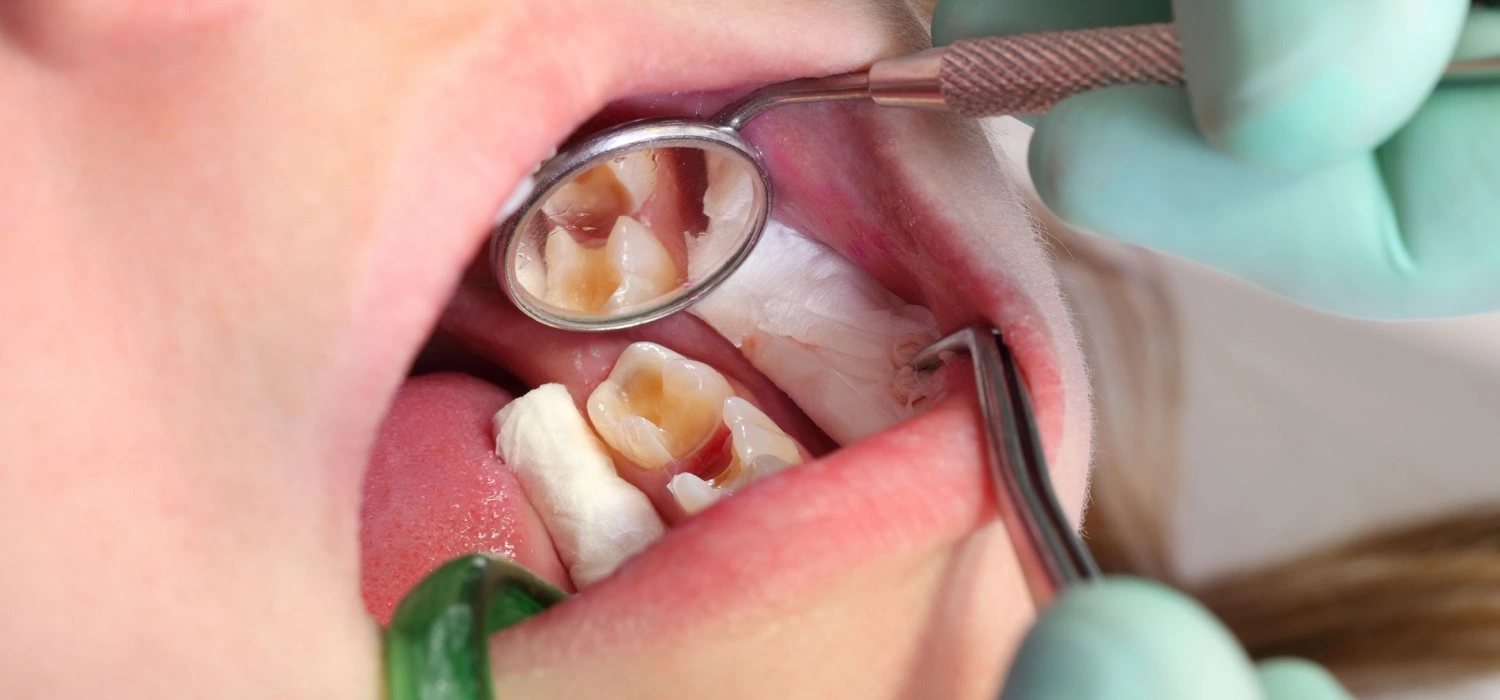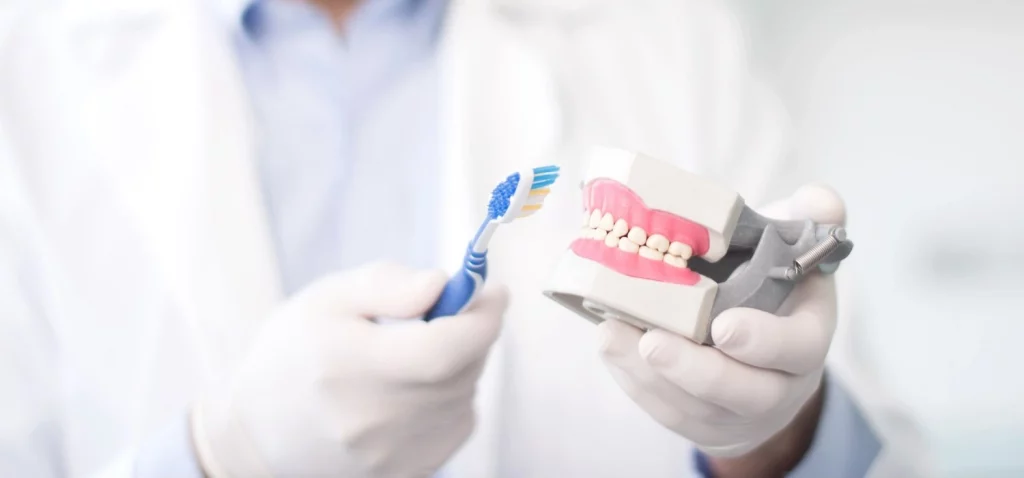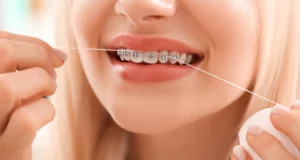Last Updated on: 2nd October 2024, 10:21 am
✓ Fact Checked 🕓
❙ Our team of writers, editors, and medical experts rigorously evaluates each article to ensure the information is accurate and exclusively cites reputable sources.
❙ We regularly assess how the content in this article aligns with current scientific literature and expert recommendations in order to provide the most up-to-date research.
Bulimia nervosa is a mental health disorder that generates uncontrolled eating habits causing bulimia teeth. People who suffer from bulimia usually eat large amounts of food in a short period (binge eating) and then purge to avoid gaining weight. This is achieved through self-induced vomiting, the intake of laxatives, the use of diuretics, and physical activity in excess, among others.
Self-induced vomiting is the most common purging method, but the act of vomiting frequently exposes the teeth to stomach acids, causing serious dental problems.
This article will provide an overview of bulimia teeth that can affect your oral health. Additionally, you will discover preventative methods and ways to restore the damage caused by this eating disorder.
Oral Signs and Symptoms of Bulimia Teeth

Most people who suffer from bulimia vomit between 2 and 20 times a day, experiencing dental damage due to the acidic stomach contents that come in contact with the teeth. These acids are corrosive and erode the enamel that covers and protects teeth.
Generally, during a dental check-up, those who suffer from bulimia teeth can be easily recognized. Some oral signs and symptoms of this disorder are:
1. Enamel erosion
The destruction of dental enamel is caused by excessive exposure of acid substances to the edges of the front teeth, especially the upper ones which will appear more transparent. The more episodes of vomiting, the greater the enamel erosion caused by acid contact with the teeth.
2. Brittle teeth
The teeth become rough and irregular; they can easily break and crack.
3. Tooth discoloration
The dentin is the layer of the tooth below the dental enamel. With bulimia, the dentin is exposed, and since it is darker in color than the enamel, the natural white of the teeth is lost, and they take on a yellowish color.
4. Hypersensitivity in the teeth
The dentin is exposed, and the teeth can become very sensitive to sweet, cold, and hot foods.
5. Dry mouth and lips
There may be a decrease in saliva production, known as xerostomia; the mouth feels dry and the lips crack easily.
6. Canker sores and mouth sores
Stomach acid not only wears away enamel, but it can also damage the throat and oral cavity, leading to canker sores and throat discomfort.
7. Periodontal changes
With a dry mouth and the accumulation of bacteria, the gums can become irritated, hurt, and bleed, causing problems such as gingivitis or periodontitis. In some cases, the effect can be severe.
8. Inflammation of the salivary glands
The parotid glands can become inflamed as a result of constant vomiting, generating inflammation at the level of the lower jaw, giving the appearance of a wide and square face. Parotid inflammation will directly depend upon the duration and severity of vomiting.
When a person suffers from bulimia and presents these dental signs and symptoms, there is a high probability of developing dental caries since the absence of enamel and the cracks in it will accommodate plaque more easily, causing the decay to progress faster and become more serious than in a normal tooth.
How to Protect the Oral Cavity from Bulimia?
Many people brush their teeth immediately after vomiting to remove the odor and avoid detection, but that’s a common mistake, as the toothbrush spreads stomach acids around the mouth, plus there is abrasion from the toothpaste. Combined with acids, it considerably increases the erosion of tooth enamel.

Initially, it is recommended to schedule a dental check-up. The dentist will do a clinical examination to determine the state of health of the teeth, gums, and mouth in general. This will determine the indicated treatment for each case.
Although it is not possible to reverse the damage caused by bulimia to the teeth, if it can be treated, some treatment options are:
Resin restorations
Resins can be placed on eroded teeth with minor discoloration and damage. This provides an extra layer of protection to the tooth to prevent further erosion of the enamel.
Veneers
When the anterior teeth are very damaged, veneers can be placed to replace the enamel surface that has been lost and provide protection and aesthetics to the affected teeth; these can be in resin or porcelain.
Crowns
In more severe cases, when the erosion of the enamel is severe and it has been completely lost or fractured, it is recommended to insert dental crowns to protect the teeth from further wear and damage to the dental structure.
Fluoride gel or varnish
Helps reduce dental sensitivity.
In the case of gum disease (gingivitis and periodontitis), the treatment options are:
Simple tooth cleaning
When there is inflammation of the gums that compromises only the soft tissues (gingivitis), it is recommended to perform a traditional dental cleaning to eliminate the soft plaque present on the dental surface and reduce inflammation of the gums.
Deep cleaning
When there is inflammation of the gums that compromises the tissues that support the tooth inside the mouth (periodontal ligament, bone, cement), it is recommended to do a deep dental cleaning, known as scaling and root planing to remove hard plaque and the soft tissue present on the tooth surface above and below the gum line.
Treatment for dry mouth includes the use of saliva substitutes, constant hydration with water, and the use of special rinses, among others.
How to Maintain Oral Health when Having Bulimia Teeth?

It is important to consult with various specialists in psychology, nutrition, and medicine to treat bulimia teeth; meanwhile, to the extent possible, oral health can be maintained by following these recommendations:
1. Schedule dental consultation regularly
It is advisable to visit the dentist at least every 6 months for a check-up. In cases of bulimia, it may be necessary to visit every 3 months to confirm the patient’s state of oral health and treat any condition that occurs in the teeth, gums, or salivary glands in time.
2. Wait to brush your teeth
After a vomiting episode, it is recommended to rinse your mouth with water and wait at least 30 minutes before brushing your teeth. You can consider using xylitol toothpaste.
3. Healthy diet
Limit the consumption of highly acidic foods and drinks that further erode enamel and reduce the consumption of sugary foods and drinks since a high intake of these substances increases the possibility of developing cavities.
4. Chew sugarless gum (with Xylitol) between meals
The activity of chewing gum increases saliva production up to 10 times more than normal.
5. Proper oral hygiene
Use hygiene items such as low-abrasive fluoride toothpaste, dental floss, a soft-bristled toothbrush, and mouthwash.
Bulimia not only affects the general health of those who suffer from it but also one’s oral health. Therefore, although dental restorations can help protect teeth in the short term, the ideal is to seek a definitive solution to the disorder to protect the body in general, including the teeth.
Frequently Asked Questions
What is commonly seen on the teeth of a bulimic patient?
Common indicators of dental issues associated with bulimia include: Tooth erosion: As teeth undergo erosion, they become transparent and see-through. The edges of the teeth may appear irregular and jagged. This type of damage tends to occur gradually over time.
Can bulimia nervosa can lead to stomach tissue damage and tooth decay?
Bulimia can result in numerous problems within the digestive system, such as: the development of ulcers in the mouth and throat, damage to the stomach due to overeating, and tooth decay caused by frequent vomiting.
Treating the effects of bulimia on teeth
Regular vomiting can wear down dental enamel and lead to cavities. Teeth affected by this may require dental restorations. Veneers, crowns, or overlays can assist in repairing damaged teeth. Additionally, some individuals might need periodontal plastic surgery.
What are the oral conditions of a patient with bulimia?
Bulimia teeth is a severe and permanent condition that can manifest within six months of the onset of bulimia nervosa. Dental issues resulting from frequent vomiting include a rise in cavities, heightened sensitivity to hot and cold foods and beverages, dry mouth, enamel erosion, and swollen salivary glands.
Does vomit damage teeth?
Repeated vomiting can severely harm teeth. Vomit is harmful due to the presence of stomach acids. These acids decompose food in your stomach for digestion. However, in the mouth, these acids are corrosive and potent enough to erode the enamel that covers and protects your teeth.
Share:
References
1. Eating Disorder Hope. (September 20, 2022). Bulimia: Dental Problems Caused by Repeated Vomiting. https://www.eatingdisorderhope.com/information/bulimia/dental-problems-caused-by-bulimia
2. Eder, A. (2017).The effect of bulimia on the dentition. BDJ team, 4(4). https://doi.org/10.1038/bdjteam.2017.63
3. National Eating Disorders Association. (July 14, 2021). Statistics & Research on Eating Disorders. https://www.nationaleatingdisorders.org/statistics/
4. Rosten , A. , & Newton , T. (2017). The impact of bulimia nervosa on oral health: A review of the literature. British Dental Journal, 223(7), 533-539. https://doi.org/10.1038/sj.bdj.2017.837
5. Uhlen, M.M., Tveit, A.B., Stenhagen, K.R., & Mulic, A. (2014).Self-induced vomiting and dental erosion – a clinical study. BMC Oral Health, 14(1). https://doi.org/10.1186/1472-6831-14-92
6. Valdez, R. (October 18, 2021).How Does Bulimia Affect the Teeth? Verywell Health. https://www.verywellhealth.com/bulimia-teeth-5203972
7. Watson, S. (Updated: December 17, 2016). Bulimia’s Effect on Teeth. Healthline. https://www.healthline.com/health/bulimia-teeth














